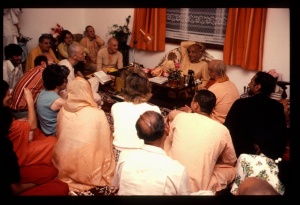SB 1.11.35

A.C. Bhaktivedanta Swami Prabhupada
TEXT 35
- sa eṣa nara-loke 'sminn
- avatīrṇaḥ sva-māyayā
- reme strī-ratna-kūṭastho
- bhagavān prākṛto yathā
SYNONYMS
saḥ — He (the Supreme Personality of Godhead); eṣaḥ — all these; nara-loke — on this planet of human beings; asmin — on this; avatīrṇaḥ — having appeared; sva — personal, internal; māyayā — causeless mercy; reme — enjoyed; strī-ratna — woman who is competent to become a wife of the Lord; kūṭasthaḥ — among; bhagavān — the Personality of Godhead; prākṛtaḥ — mundane; yathā — as if it were.
TRANSLATION
That Supreme Personality of Godhead Śrī Kṛṣṇa, out of His causeless mercy, appeared on this planet by His internal potency and enjoyed Himself amongst competent women as if He were engaging in mundane affairs.
PURPORT
The Lord married and lived like a householder. This is certainly like a mundane affair, but when we learn that He married 16,108 wives and lived with them separately in each and every palace, certainly it is not mundane. Therefore, the Lord, living as a householder amongst His competent wives, is never mundane, and His behavior with them is never to be understood as mundane sex relation. The women who became the wives of the Lord are certainly not ordinary women, because to get the Lord as one's husband is the result of many, many millions of births' tapasya (austerity). When the Lord appears on different lokas, or planets, or on this planet of human beings, He displays His transcendental pastimes just to attract the conditioned souls to become His eternal servitors, friends, parents and lovers respectively in the transcendental world, where the Lord eternally reciprocates such exchanges of service. Service is pervertedly represented in the material world and broken untimely, resulting in sad experience. The illusioned living being conditioned by material nature cannot understand out of ignorance that all our relations here in the mundane world are temporary and full of inebrieties. Such relations cannot help us be happy perpetually, but if the same relation is established with the Lord, then we are transferred to the transcendental world after leaving this material body and become eternally related with Him in the relation we desire. The women amongst whom He lived as their husband are not, therefore, women of this mundane world, but are eternally related with Him as transcendental wives, a position which they attained by perfection of devotional service. That is their competency. The Lord is paraṁ brahma, or the Supreme Personality of Godhead. Conditioned souls seek after perpetual happiness in all places—not only on this earth but also on other planets throughout the universe—because constitutionally a spiritual spark, as he is, can travel to any part of God's creation. But being conditioned by the material modes, he tries to travel in space by spacecraft and so fails to reach his destination. The law of gravitation is binding upon him like the shackles of a prisoner. By other processes he can reach anywhere, but even if he reaches the highest planet, he cannot attain that perpetual happiness for which he is searching life after life. When he comes to his senses, however, he seeks after Brahman happiness, knowing it for certain that unlimited happiness, which he is seeking, is never attainable in the material world. As such, the Supreme Being, Parabrahman, certainly does not seek His happiness anywhere in the material world. Nor can His paraphernalia of happiness be found in the material world. He is not impersonal. Because He is the leader and Supreme Being amongst innumerable living beings, He cannot be impersonal. He is exactly like us, and He has all the propensities of an individual living being in fullness. He marries exactly like us, but His marriage is neither mundane nor limited by our experience in the conditioned state. His wives, therefore, appear like mundane women, but factually they are all transcendental liberated souls, perfect manifestations of internal energy.